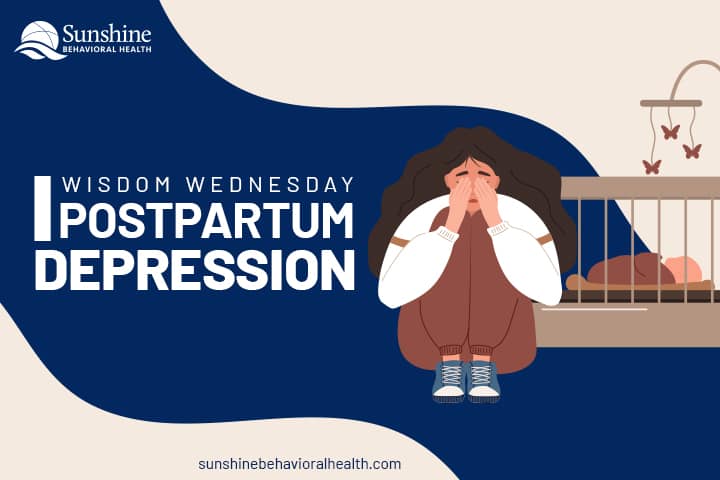
Wisdom Wednesday—Postpartum Depression
Meaning the period after giving birth, “postpartum” is when mothers often feel sad and gloomy. These symptoms after childbirth are called baby blues. Many women experience baby blues but shake the effects after about 3–5 days. However, if a mother’s baby blues symptoms don’t stop after two weeks, she likely has postpartum depression, commonly seen in one in nine new mothers. Any degree of postpartum depression can occur after miscarriage and stillbirth as well.
What is Postpartum Depression?
Postpartum depression is a mental illness that can drastically change how you behave and negatively affect your physical health. Symptoms of postpartum depression include:
- Severe mood swings.
- Excessive crying.
- Trouble bonding with the baby.
- Insomnia.
- Anger.
- Anxiety.
- Feelings of being a bad mother.
- Loss of energy.
Postpartum depression can start during pregnancy or after childbirth, miscarriage, or stillbirth and can last for months. While there is no single cause of this mental illness, physical and emotional issues likely have something to do with it. For example, there is a dramatic drop in hormones in a mother’s body after childbirth. This can leave a mother feeling physically tired and depressed. Further, losing sleep and being overwhelmed are both things that all mothers expect to experience; however, these things can help worsen postpartum depression.
Postpartum Depression vs. Baby Blues
There is a substantial difference between postpartum depression and baby blues. The easiest way to tell the difference between the two is by noting the timeline and the severity of the symptoms. Further explained:
- Baby blues flares up for a few hours each day and should dissipate entirely after about two weeks from delivery. Postpartum depression, on the other hand, can last from months to a full year if left untreated.
- Symptoms of baby blues are fatigue and sadness, but symptoms of postpartum depression are often more severe. For example, postpartum depression can leave a mother feeling aggressive, extreme stress, and detachment from the baby.
How to Manage Postpartum Depression
Using proven and effective ways to cope with postpartum depression may ease the symptoms. Consider these five techniques to manage postpartum depression:
Talking with Others. Many mothers are too ashamed to admit how they are feeling. Postpartum depression is not very likely to fizzle on its own, so seeking help can be crucial to feeling better. Postpartum depression can be confusing, so self-medicating could be a likely mistake. Instead, know that it is treatable, so contacting a health care professional should be the first thing to check off the list.
Bonding with the Baby. Bonding with their baby emotionally is important for all parents, but postpartum depression can make it difficult to do so. Skin-to-skin contact, baby massage, smile exercises, and singing are all things that can help improve the bond between parent and baby.
Practicing Self-Care. Many new mothers can feel overwhelmed by their new baby and the responsibilities that it brings. After pregnancy, a mother needs to take care of herself as well. This includes staying on a healthy diet, getting enough sleep, soaking up enough sun, and taking their newborn for walks.
Slowly Introducing Exercise. Along with a healthy diet and getting enough sleep, a mother should slowly ease herself back into exercising. Physical activity is a natural antidepressant that can improve sleep quality and boost energy. Mothers don’t need to do any crazy weightlifting or marathon running; 10–30 minutes a day of walking or light work will do the trick.
Finding Support. Loneliness can be a trigger for postpartum depression, so it’s important to find a support network (a few friends or family members) to be able to confide in. If friends or family members are not an option, there are always classes and support groups available for new parents.
Sources:
www.womenshealth.gov – Postpartum Depression
sunshinebehavioralhealth.com – Managing Postpartum Depression
www.mayoclinic.org – Postpartum depression
www.henryford.com – Baby Blues Vs. Postpartum Depression
www.postpartum.net – Find Local Support
www.postpartum.net – Get Help
A Message From Our CEO
Medical disclaimer:
Sunshine Behavioral Health strives to help people who are facing substance abuse, addiction, mental health disorders, or a combination of these conditions. It does this by providing compassionate care and evidence-based content that addresses health, treatment, and recovery.
Licensed medical professionals review material we publish on our site. The material is not a substitute for qualified medical diagnoses, treatment, or advice. It should not be used to replace the suggestions of your personal physician or other health care professionals.





